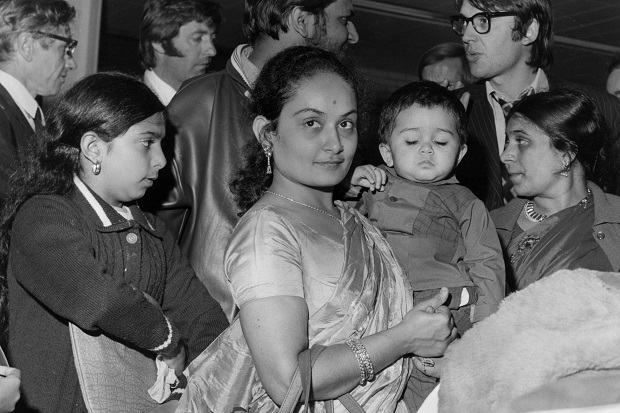The British government has said it will allow in some of Syria’s most vulnerable refugees. The Home Office hasn’t specified how many will be admitted but says it will probably be in the hundreds. The Syrian civil war has created 2.4 million refugees and 6.5 million internally displaced people, and looking through the archive, you get the sense that some of The Spectator’s former writers might have thought Britain could have offered more this time.
The government’s attitude towards Jewish refugees in 1944 was ‘niggardly, bureaucratic, evasive and insincere’, according to the diplomat Harold Nicolson. We’ve historically been ‘proud to succour the oppressed and to defend the weak. We were glad to feel that those who could escape from the claws of foreign despots might find in this country, not asylum merely, but an opportunity to make a profitable and respected living.’ There were an estimated 140,000 refugees in Britain in 1944, and Nicolson estimated we would be left with 40,000 after the war, figures he said that suggested that ‘from our vast granary of tolerance and kindness we should accord to them a bushel of generosity; that we should give them full rights of British citizenship; and that we, who have been granted such favours, who have earned such wide renown should share some at least of our fortune with the unfortunate.’
His argument echoed a piece from 1939 in which Dr G.F McCleary argued that the many of the people seeking asylum in Britain were highly skilled workers who would enrich the culture and the economy. He pointed out that when the Protestant Huguenots were facing religious persecution in France, 50,000 of them came to England. It was a very successful act of generosity, partly because many Huguenots went on to become successful silk weavers, economists, soldiers and artists.
‘To imagine that the refugees are carriers, so to speak, of germs of unemployment is to misconceive the position,’ he wrote. ‘Our ancestors fortunately held no such mistaken views about the Huguenots.’
Again, in the 1960s, large numbers East African Asians sought refuge here. The Spectator argued that Britain must let them in:
‘Historically, Britain has, to her great credit, always opened her doors to victims of persecution abroad. To shut them now, to refugees holding valid UK passports, and in breach of a solemn undertaking given only five years ago, would be a most shameful scandal.’
The editorial acknowledged that it wouldn’t be easy to assimilate more than 200,000 refugees, but said some of those difficulties would be overcome if a moratorium were placed on economic immigration until the refugees had been absorbed:
‘This country has a tradition of opening its doors to victims of persecution: it does not, happily, have a tradition of importing cheap labour. At the present time we can afford to allow one of these two categories of immigrant in, but not both. It is surely not possible to doubt what our choice should be.’
Immigration has a tendency to present a dilemma between statesmanship and political expediency. In 1968, the Labour minister Richard Crossman supported his government’s immigration act, restricting Commonwealth citizens’ right of entry. He explained that though it was an ‘appalling violation of our deepest principles’, he was ‘an MP for a constituency in the Midlands, where racialism is a powerful force’. Andrew Kenny, who grew up in South Africa, remembered that incident as he recalled ‘the greatest political shock’ of his life when he came to England in 1972:
‘I believed that my fellow white South Africans were uniquely racist. A few months after my arrival, Idi Amin announced that he was going to expel all the Asians from Uganda. This startled me since it was quite contrary to my ideas about liberated black Africa. But what devastated me was the reaction of ordinary white British people, especially white workers, to the arrival of these frightened and unhappy brown people in England. There was massive hostility, a wave of racist hysteria worse than anything I had ever experienced in South Africa. It shook me to the core.’
As a nation, we may be proud of accepting more than 20,000 refugees from Hungary after the failed uprising in 1956, but we ought to have done more, Peter Kemp argued twenty years later: ‘Apart from its romance and heroism, the Hungarian revolution was the greatest, perhaps the last, chance for the West to halt the progress of Soviet imperialism. The West, apart from noises of sympathy and encouragement, did nothing.’
But we have an even less glorious record with Poland, according to Timothy Garton Ash. He argued in 1982 that by signing the Yalta agreement, Britain had delivered Poland into Russia’s hands. He described the misery of people trying to get out of Poland, 120 to a room, malnutrition, exhaustion, complexions like putty.
‘Poland’s wartime ally, the country which took almost 16,000 Hungarian refugees from Austria in 1956-57 (four thousand more than the United States), famous refuge of the oppressed — Britain has risen to her now customary heights of selflessness and hospitality by accepting the grand total of one Polish refugee from the Austrian government in 1981. One.’
And what about what happens when they get here? Roy Kerridge’s 1987 piece about the lives of Ukrainian exiles in Bradford is worth reading in full.






Comments